Related Research Articles
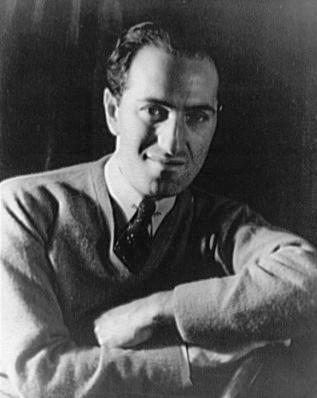
George Gershwin was an American composer and pianist whose compositions spanned popular, jazz and classical genres. Among his best-known works are the orchestral compositions Rhapsody in Blue (1924) and An American in Paris (1928), the songs "Swanee" (1919) and "Fascinating Rhythm" (1924), the jazz standards "Embraceable You" (1928) and "I Got Rhythm" (1930), and the opera Porgy and Bess (1935), which included the hit "Summertime".

Ira Gershwin was an American lyricist who collaborated with his younger brother, composer George Gershwin, to create some of the most memorable songs in the English language of the 20th century. With George, he wrote more than a dozen Broadway shows, featuring songs such as "I Got Rhythm", "Embraceable You", "The Man I Love" and "Someone to Watch Over Me". He was also responsible, along with DuBose Heyward, for the libretto to George's opera Porgy and Bess.
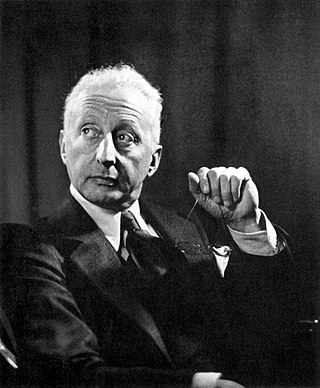
Jerome David Kern was an American composer of musical theatre and popular music. One of the most important American theatre composers of the early 20th century, he wrote more than 700 songs, used in over 100 stage works, including such classics as "Ol' Man River", "Can't Help Lovin' Dat Man", "A Fine Romance", "Smoke Gets in Your Eyes", "The Song Is You", "All the Things You Are", "The Way You Look Tonight" and "Long Ago ". He collaborated with many of the leading librettists and lyricists of his era, including George Grossmith Jr., Guy Bolton, P. G. Wodehouse, Otto Harbach, Oscar Hammerstein II, Dorothy Fields, Johnny Mercer, Ira Gershwin and Yip Harburg.

Otto Abels Harbach, born Otto Abels Hauerbach was an American lyricist and librettist of nearly 50 musical comedies and operettas. Harbach collaborated as lyricist or librettist with many of the leading Broadway composers of the early 20th century, including Jerome Kern, Louis Hirsch, Herbert Stothart, Vincent Youmans, George Gershwin, and Sigmund Romberg. Harbach believed that music, lyrics, and story should be closely connected, and, as Oscar Hammerstein II's mentor, he encouraged Hammerstein to write musicals in this manner. Harbach is considered one of the first great Broadway lyricists, and he helped raise the status of the lyricist in an age more concerned with music, spectacle, and stars. Some of his more famous lyrics are "Smoke Gets in Your Eyes", "Indian Love Call" and "Cuddle up a Little Closer, Lovey Mine".
This is a list of notable events in music that took place in the year 1919.

Jean Schwartz was a Hungarian-born Jewish American composer and pianist. He is best known for his work writing the scores for more than 30 Broadway musicals, and for his creation of more than 1,000 popular songs with the lyricist William Jerome. Schwartz and Jerome also performed together on the vaudeville stage in the United States; sometimes in collaboration with Maude Nugent, Jerome's wife, and the Dolly Sisters. Schwartz was married to Jenny Dolly from 1913-1921.

Guy Reginald Bolton was an Anglo-American playwright and writer of musical comedies. Born in England and educated in France and the US, he trained as an architect but turned to writing. Bolton preferred working in collaboration with others, principally the English writers P. G. Wodehouse and Fred Thompson, with whom he wrote 21 and 14 shows respectively, and the American playwright George Middleton, with whom he wrote ten shows. Among his other collaborators in Britain were George Grossmith Jr., Ian Hay and Weston and Lee. In the US, he worked with George and Ira Gershwin, Kalmar and Ruby and Oscar Hammerstein II.
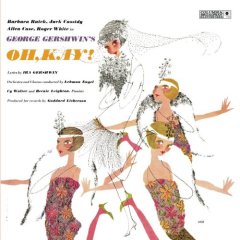
Oh, Kay! is a musical with music by George Gershwin, lyrics by Ira Gershwin, and a book by Guy Bolton and P. G. Wodehouse. It is based on the play La Présidente by Maurice Hennequin and Pierre Veber. The plot revolves around the adventures of the Duke of Durham and his sister, Lady Kay, English bootleggers in Prohibition Era America. Kay finds herself falling in love with a man who seems unavailable. The show is remembered for its enduring song, "Someone to Watch Over Me".

Shuffle Along is a musical composed by Eubie Blake, with lyrics by Noble Sissle and a book written by the comedy duo Flournoy Miller and Aubrey Lyles. One of the most notable all-Black hit Broadway shows, it was a landmark in African-American musical theater, credited with inspiring the Harlem Renaissance of the 1920s and '30s.
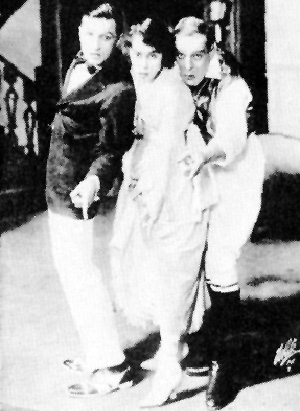
Oh, Boy! is a musical in two acts, with music by Jerome Kern and book and lyrics by Guy Bolton and P. G. Wodehouse. The story concerns befuddled George, who elopes with Lou Ellen, the daughter of Judge Carter. He must win over her parents and his Quaker aunt. His dapper polo champion friend Jim is in love with madcap actress Jackie, but George must hide her while she extricates herself from a scrape with a bumbling constable whom she punched at a party raid.

The Princess Theatre was a joint venture between the Shubert Brothers, producer Ray Comstock, theatrical agent Elisabeth Marbury and actor-director Holbrook Blinn. Built on a narrow slice of land located at 104–106 West 39th Street, just off Sixth Avenue in New York City, and seating just 299 people, it was one of the smallest Broadway theatres when it opened in early 1913. The architect was William A. Swasey, who designed the Winter Garden Theatre two years earlier.
Henry Martyn Blossom Jr. was an American writer, playwright, novelist, opera librettist, and lyricist. He first gained wide attention for his second novel, Checkers: A Hard Luck Story (1896), which was successfully adapted by Blossom into a 1903 Broadway play, Checkers. It was Blossom's first stage work and his first critical success in the theatre. The play in turn was adapted by others creatives into two silent films, one in 1913 and the other in 1919, and the play was the basis for the 1920 Broadway musical Honey Girl. Checkers was soon followed by Blossom's first critical success as a lyricist, the comic opera The Yankee Consul (1903), on which he collaborated with fellow Saint Louis resident and composer Alfred G. Robyn. This work was also adapted into a silent film in 1921. He later collaborated with Robyn again; writing the book and lyrics for their 1912 musical All for the Ladies.
Maceo Pinkard was an American composer, lyricist, and music publisher. Among his compositions is "Sweet Georgia Brown", a popular standard for decades after its composition and famous as the theme of the Harlem Globetrotters basketball team.
Joe DiPietro is an American playwright, lyricist and author. He is best known for the Tony Award-winning musical Memphis, for which he won the Tony Awards for Best Book of a Musical and Best Original Score as well as for writing the book and lyrics for the long-running off-Broadway show I Love You, You're Perfect, Now Change.

La La Lucille is a musical with a book by Fred Jackson, primary lyrics by Arthur J. Jackson and Buddy DeSylva, additional lyrics by Lou Paley and Irving Caesar, and music by George Gershwin.
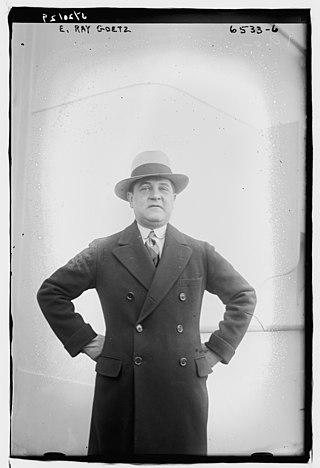
Edward Ray Goetz was an American composer, lyricist, playwright, theatre director, and theatrical producer. A Tin Pan Alley songwriter, he published more than 500 songs during his career, many of them originally written for the New York stage. His songs were recorded by several artists, including Judy Garland, Al Jolson, and Blossom Seeley. He was active as both a lyricist and composer for Broadway musicals from 1906 through to 1930, collaborating with artists like George Gershwin, Cole Porter, Sigmund Romberg, and A. Baldwin Sloane to create material for the theatre.

Frederick A. Thompson, usually credited as Fred Thompson was an English writer, best known as a librettist for about fifty British and American musical comedies in the first half of the 20th century. Among the writers with whom he collaborated were George Grossmith Jr., P. G. Wodehouse, Guy Bolton and Ira Gershwin. Composers with whom he worked included Lionel Monckton, Ivor Novello and George Gershwin.
Miss 1917 is a musical revue with a book by Guy Bolton and P. G. Wodehouse, music by Victor Herbert, Jerome Kern and others, and lyrics by Harry B. Smith, Otto Harbach, Henry Blossom and others. Made up of a string of vignettes, the show features songs from such musicals as The Wizard of Oz, Three Twins, Babes in Toyland, Ziegfeld Follies and The Belle of New York.

Development of musical theatre refers to the historical development of theatrical performance combined with music that culminated in the integrated form of modern musical theatre that combines songs, spoken dialogue, acting and dance. Although music has been a part of dramatic presentations since ancient times, modern Western musical theatre developed from several lines of antecedents that evolved over several centuries through the 18th century when the Ballad Opera and pantomime emerged in England and its colonies as the most popular forms of musical entertainment.
Christopher Edward Adler was an American lyricist and theatre director. His best-known works as a lyricist were the musical Jean Seberg and the show Shirley MacLaine on Broadway.
References
- ↑ Mantle, Burns; Sherwood, Garrison P. (1943). "Ladies First". The Best Plays of 1909-1919. Dodd, Mead & Co. p. 641.
- 1 2 3 Suskin, Steven (2000). "George Gershwin; section Ladies First". Show Tunes: The Songs, Shows, and Careers of Broadway's Major Composers. Oxford University Press. pp. 57–58. ISBN 9780195125993.
- 1 2 Dietz, Dan (2021). "Ladies First". The Complete Book of 1910s Broadway Musicals. Rowman & Littlefield Publishers. pp. 451–453. ISBN 9781538150283.